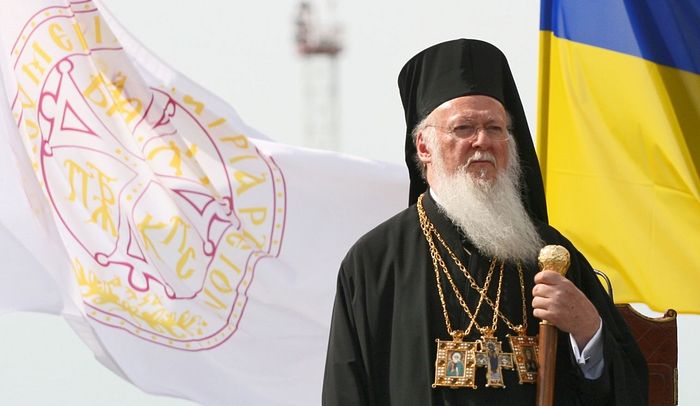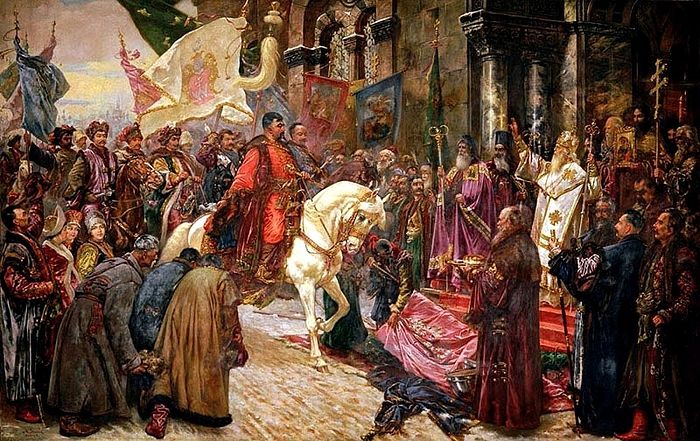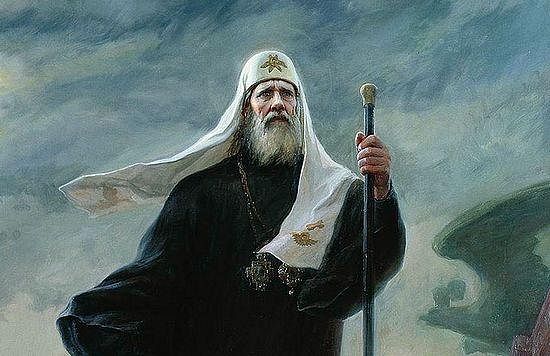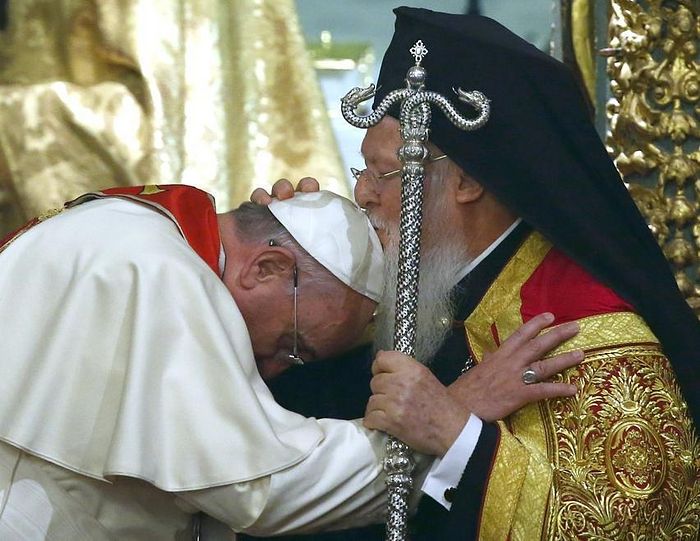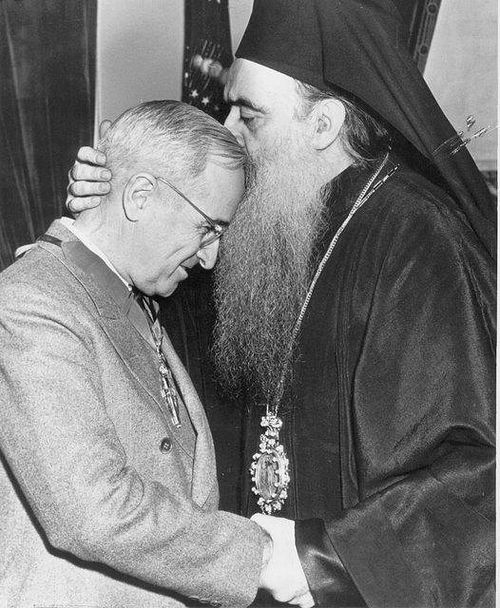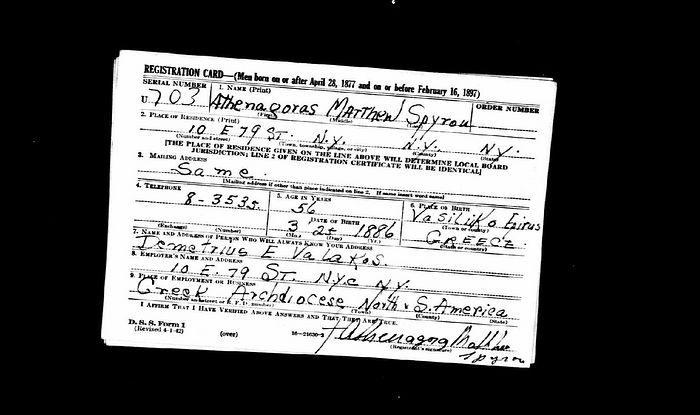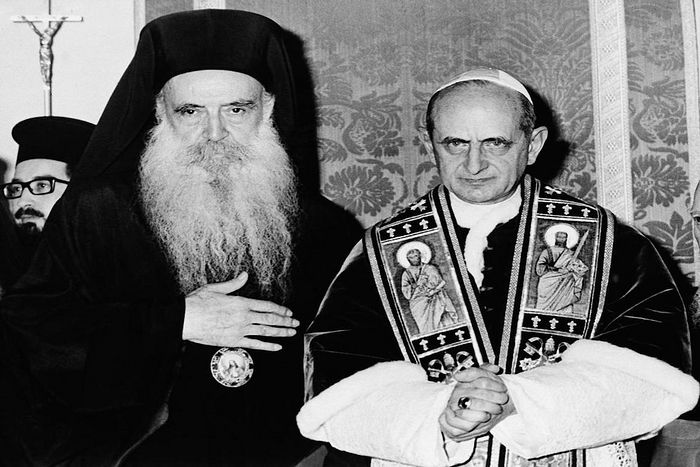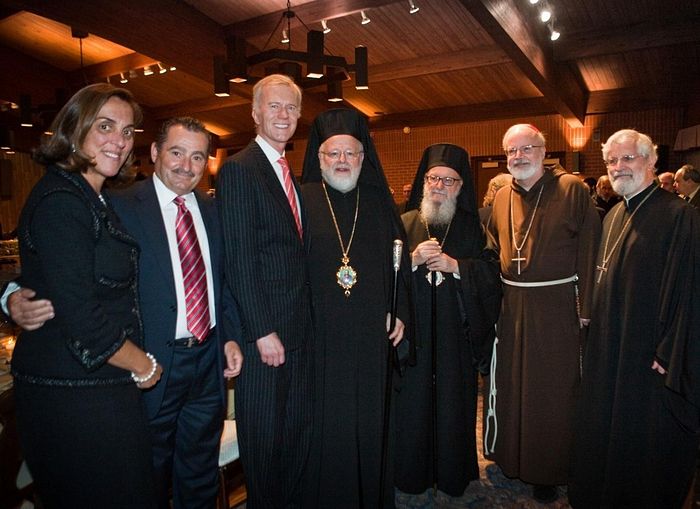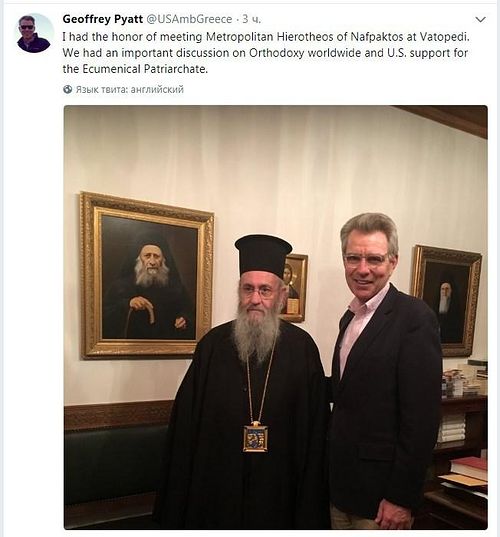The Secret Political History of the Ecumenical Patriarchate. Matfey Shaheen (original) (raw)
There was a time, when the Patriarchate of Constantinople was in its prime…it’s former glory has passed into pale memory, and this schismatic crime which it has championed in Ukraine, has become among the greatest issues for Orthodoxy in the twenty-first century.
Since the Ecumenical Patriarchate anti-canonically invaded the territory of the Ukrainian Orthodox Church—an autonomous and native part of the Russian Church, many have asked:
Is this the rise of some peculiar form of “Eastern Papism”, or is the Ecumenical Patriarchate not truly sovereign in its actions, but under the influence of foreign political powers, including the United States?
This article is not written to examine the spiritual or canonical issues of Constantinople’s errors, as this has already been done by experts across the Orthodox world.
This article is put forth to demonstrate the political captivity of the Ecumenical Patriarchate to foreign powers throughout history, especially the United States. We will examine how Constantinople may have been blackmailed into causing this crisis to cover up a multi-million-dollar embezzlement scandal in their GOARCH—the main source of their funding and their economic lifeline.
We will in particular examine a very shocking article from a pro-Ecumenical Patriarchate source, which declares, among many things:
“President Truman often emphasized the pro-American convictions of Patriarch Athenagoras and the importance and influence of the Ecumenical Patriarchate, along with the Greek Orthodox community in the US, as vital to American foreign policy objectives.”1
How did we get here?
In order to understand the origins of this Ukrainian Church crisis, and the liberal and apparently anti-Russian trend in Constantinople, we must look at history. For those unaware of the History of Orthodoxy in Ukraine, I highly recommend this wonderful series.
To simplify, Kievan Rus’ was the ancestor to modern Russia, Ukraine, and Belarus. It was divided by both Mongol and Polish-Lithuanian conquest into eastern (Russia) and western (Ukraine and Belarus) portions. In the East, the Rus’ Church was freer, because non-Christian Mongols were less interested in the intricate details of Orthodoxy than the Catholic Poles, Lithuanians, and later Austrians who would rule the West.
The First Western Pivot of Constantinople
In the mid-fifteenth century, two catastrophic events occurred for the Patriarchate of Constantinople, which succeeded in destroying their political independence, and almost destroyed their religious independence as well.
The First was the Florentine Union, in which, Hierarchs of Constantinople, hoping to save the city from Ottoman destruction, signed a union with the Roman Catholic Church, agreeing to recognize the primacy of the Pope.
This was a cataclysmic event, as this, in many ways, was the beginning of the liberal and Western-political leaning of the Patriarchate of Constantinople.
The choice of Constantinople was the polar opposite of the Russian Saint Alexander Nevsky, Grand Prince of Vladimir and Kiev, who in short, would rather be a political subject to Tatars than a spiritual subject to Catholics. Constantinople thinks to use the political-military power of the fallen West to save themselves and the true Faith, but in doing that, they already lost everything! They forgot the lesson of Alexander Nevsky, who said, “God is not found in power, but in Truth!” This has always been the position of the Russian Church, as Patriarch Kirill of Moscow said in his sermon on Mark of Ephesus, who opposed the Union of Florence:
“There can be no union under threat of schism!”2
And so, at that time, the Church of Eastern Rus’—of Moscow, together with Grand Prince Vasily were horrified by the idea of union with the schismatic Rome, so they declared autocephaly from Constantinople. The Russian Church rose to autocephaly to flee from the heretical-schismatic errors of Constantinople!
The Fall of Constantinople
Constantinople, narrowly avoiding union with Rome, (thanks in no small part to Saint Mark of Ephesus) fell in 1453. Constantinople’s days as an Imperial City and Church ended, they were now desperate for survival, and at times, willing to sell out.
The Kievan Metropolia
“Catholic priests are going about through Ukraine in carts pulled by simple Orthodox Christians! This is what is happening in Ukraine, while you sit here feasting, having neither eyes nor ears concerning what is happening in the world!” ~ Taras Bulba, N.V. Gogol3
The Catholic Polish-Lithuanians would not allow their subjects in the Western Rus’ Church—the Kievan Metropolia—to unite with the Eastern Rus’ Church in Moscow, so Kiev was forced to look to Constantinople.
Impoverished Constantinople, however, was in survival mode, and more concerned with acquiring material support, than with the complex spiritual issues of the Kievan Metropolia.
For example, shortly before the Union of Brest, Patriarch Jeremias II of Constantinople visited Western Rus’; at that time, certain clerics who would later become schismatics, behaved like Borgias—violent warlords, and were afraid of being deposed when they heard he was coming.4 Those Bishop-Warlords had nothing to fear, however, as it turned out Jeremias was just passing through on his way to Moscow, to among other things, beg for alms from the rich and free Russian Church. When he returned to Kiev, he also seemed more concerned with collecting money than dealing with the huge issues the church there was facing.
Still, certain hierarchs in Right Bank Ukraine were integrated into the Polish nobility, and feared being deposed for their various crimes, opened up to the idea of the Union of Brest with Rome. The Polish rulers of course, politically favored those who joined the Union, as it divided the Rus’ peoples—their rivals.
This politically motivated land grab seems similar to what Constantinople is doing today in Ukraine. They’re less concerned with legalizing Uniate-supporting schismatics, who possess alarming Nazi tendencies, and perhaps more interested in collecting money from those 20 metochi the Ukrainian President promised them.
It was during the disastrous period of their stewardship of the Kievan Metropolia, that the Union emerged, and by their apathetic and anemic leadership, they did nothing to prevent it.
Ironically, one of the biggest supporters of the Uniate Movement in previous centuries was Gregory (“the Bulgarian”), who was installed briefly as Metropolitan of Kiev by the former Patriarch Gregory of Constantinople… who himself became a Uniate!
The people who would eventually be called Ukrainians rose up under Cossack Hetman Bogdan Khmelnitsky and rejoined Ukraine with Russia in 1654. The Kievan Metropolia soon followed, leaving Constantinople, and joined the Patriarchate of Moscow. From the 1680s until now, Constantinople never indicated once that it felt Ukraine was its territory, and even during the very small period [in relation to its whole history] that Ukraine was under Constantinople, the Phanar showed essentially zero interest in its internal spiritual affairs, becoming involved only when political or financially convenient.
The Rus’ peoples who were baptized in 988 as one, were divided by the 1360s, and reunited by the 1680s, having remained together until 1991.
Once united, nearly all these troubles melted away like dew before the sun. The Kiev-Mohyla Theological Academy founded in Kiev Caves Lavra by the Holy Hierarch Petro Mohyla was hailed by Peter the Great, and became the prototype for all Orthodox seminaries. Little Russian (i.e. Ukrainian) Bishops, favored by Peter the Great, practically speaking, occupied the Primatial Throne of the Russian Church exclusively from between 1700 to 1757.
Generally speaking, there were no earth-shattering conflicts for the Rus’ Church until the twentieth century.
The Mystery of the twentieth Century
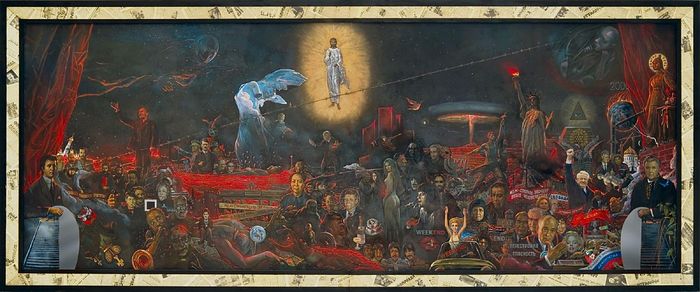 “The Mystery of the Twentieth Century”. Artist: Ilya Glazunov. Glazunov.ru.
“The Mystery of the Twentieth Century”. Artist: Ilya Glazunov. Glazunov.ru.
Perhaps no other time in human history has ever brought so much ruin, and changed the course of civilization than the twentieth century. It was also then, when the Ecumenical Patriarchate made its strongest pivot to the west, both theologically, with regards to ecumenism and the calendar issue, and politically.
The First World War swept away the spirit of Old Europe—ancient empires based on the idea of “Christendom” or some form of faith, and we saw in Europe the rise of a cold, secular nationalism.
Those who feel Christianity or religion is the source of war need only look to the twentieth century, when the worst atrocities in human history were committed by brutal, godless powers.
Pseudo-religion was only used as a tool for the political goals, and as we have seen in Modern Ukraine, among some schismatics, with their Nazi murals, sometimes their politics becomes their religion.
After the demonic assassination of the Holy Romanov family; there was a war launched against Holy Rus’, and the Russian Church began her podvig of Confession, among the largest in history. The Metropolitan of Kiev and Galicia was taken outside Kiev Caves Lavra and shot, Patriarch Tikhon of Moscow was imprisoned, countless millions suffered in the civil war…and where was Constantinople?
Constantinople was actively supporting the Bolsheviks…
The Renovationist Schism
A little-known fact by many, is that while Saint Tikhon Patriarch of Moscow was in jail, and the Church in Russia brutally persecuted, the Bolsheviks created a schismatic church.
Constantinople actually recognized this schism as legitimate, calling for Saint Tikhon to resign, slandering him, while his canonical Church was persecuted, and believers were even executed for refusing to support the “Renovationist Church”.
That situation strongly resembles this one with modern Ukrainian schismatics, complete with Phanar support.
Today, Saint Tikhon is commemorated universally as a Saint, who is very popular in America as well, having consecrated Saint Raphael of Brooklyn—a Syrian who considered himself as having a “Russian soul”—as the first hierarch on American soil.
Saint Tikhon is a Saint… and the renovationists… Where are they? They passed like the previous schismatics into ill memory, there is nothing left of them.
So, this leaves us with a question. Why would Constantinople do this, and why are they again supporting schismatics in Ukraine? The answer may be more politically based than people realize.
Interwar Chaos and the Population Exchange
WW1 ended not only the Austro-Hungarian and Russian Empires, but also the Ottoman Empire. A great population exchange took place between the newly formed secular Turkish republic, and Greece, and as a result of which, the Ecumenical Patriarchate lost almost his entire flock.5
Turkey no longer ruled a multi-ethnic Empire, in which the Ecumenical Patriarch could be used as a figure to unite the Christian subjects around; Turkey was now interested only in Turkish nation-building.
This brings the Ecumenical Patriarchate to its current state—as journalist Kirill Alexandrov noted, “the Phanar urgently had to seek a rationale for its own existence… That’s when the first claims to rule over the entire Orthodox world appear.”6
Taking advantage of the fall of the Russian Empire, and the persecution of the Russian Church as discussed above, Constantinople encroached on the territory of the Moscow Patriarchate like a black raven to the body of a still living Cossack.7
This all began from around the 1920s; while the Russian Church was defenseless in the arena of martyrdom, we saw the rise of this “Eastern Papism”. Throughout the mess that was the twentieth century, almost all the “liberal trends” in Orthodoxy, were promoted by Constantinople, for example, the scandalous switch to the new calendar, and ecumenism, especially with the Catholic Church.
Let’s not forget that it was Patriarch Athenagoras of Constantinople who first met the Pope and “lifted” the anathemas against Rome. And this is what brings us to perhaps the most important aspect of all of this, in this analysis of the Phanar’s politics—their relationship with the US Government, in particular, beginning with Patriarch Athenagoras and President Truman.
The Ecumenical Patriarchate and the US Government
Patriarch Athenagoras and President Truman
There is a very interesting article on a GOARCH blog, which essentially exposes in their own words, the relationships between the Greek Diaspora, the Ecumenical Patriarchate, and the highest echelons of western power in the form of the US President and Government.
The article by Dr. Alexandros K. Kyrou details the close relations, and perhaps collusion of the Ecumenical Patriarchate with the U.S. Government in the political arena. Look at the first sentences:
Not that long ago, American presidents understood that Washington’s active support and defense of the Ecumenical Patriarchate of Constantinople was not only consistent with the principle of religious freedom but was also an important, global resource for highlighting and communicating American values in the twin arenas of international relations and Great Power diplomacy. The history surrounding this official view of the Patriarchate as a unique partner for emphasizing democratic ideas abroad and for advancing humanitarian objectives throughout the world has, however, largely eluded public awareness while being steadily eroded from the institutional memory of this country’s foreign policy elite.
Recently declassified State Department documents reveal a fascinating story, an alternative narrative, of American interest in, and engagement with, the Ecumenical Patriarchate of Constantinople during perhaps the most critical period in US foreign policy history.8
At first, it may seem benign, after all, who does not agree with religious freedom or humanitarianism; but when you realize that Truman was the first and only person to use nuclear weapons on other human beings, and that Great Powers are rarely concerned with anything more than… well… power, you start to see these pleasant words are just euphemisms.
Ask Christians in the Middle East, or in Serbia for that matter, how Western “Democracy promotion” helped them, when it came in the form of “carpet bombings for world peace”. These are all just excuses for war, pretexts to justify political games.
With regards to the Patriarchate “emphasizing democratic ideas”, one wonders where the Christianity is in this, when for most of history, Christianity went hand in hand with monarchy, as monarchs were anointed by God and installed to rule by Him since biblical times.
In the text of the church service of the Triumph of Orthodoxy,9 there is even an anathema10 against “those who do not believe that Orthodox monarchs are put on the throne (anointed) by God”.
This is not to argue for or against monarchism; but suffice it to say, for the majority of history, the Church blessed and supported monarchy.
Since when has “emphasizing democratic ideas”, been a mission of an Orthodox Patriarchate? Why not instead, “preserving the fullness of Orthodoxy”, or “seeking first the Kingdom of Heaven”? Supporting schism is not a good way to do that…
What is all this interest in political ideologies and goals? This seems dangerously close to the liberation theology the Catholic Church adopted in the 1960s, which essentially meant the Church was more focused on fixing the human condition on (a fallen) earth, than achieving the Kingdom of Heaven.
The article goes on to explain how President Truman would enlist the Ecumenical Patriarchate because he saw “religion as a powerful tool to undermine faith in the Soviet system and to bring about its eventual downfall.”
Once again, a key word here is tool; religion was to be used as a tool. He saw the Phanar as a useful ally, a pawn, in his own earthly battle with the Soviet Union—not a battle for the salvation of souls, but for the victory of his own political goals.
Truman’s “pan-religious collation”, which would also include the Vatican, had a key goal: placing an American citizen on the throne of Constantinople—Patriarch Athenagoras (Spyrou)—the very same who would “lift the anathemas” against Rome… All this ecumenism is beginning to have a clear origin and goal now. As it was with the Florentine Union before, this was yet another time Constantinople thought it could save itself by politicking with the West.
Patriarch Athenagoras was previously the Greek Archbishop of North and South America.
Athenagoras adjusted comfortably to life in America, and apparently even attempted to enlist in the US Military11—a bit of an odd a choice for an Orthodox hierarch.
Truman’s “Sacred Cow”—Did Truman propagate the idea of Constantinople’s Primacy?
Truman was so invested in putting an American on the throne, he not only sent Athenagoras with his “blessing”, but he literally sent him to Istanbul on his own presidential plane, “The Sacred Cow”12. Dr. Kyrou says that this was not simply a gesture of respect, but what he called “a measured action” by a President who “viewed Athenagoras and the Patriarchate as influential and crucial partners in the furtherance of US international interests”.
Dr. Kyrou’s article even asserts the election of Athenagoras as Ecumenical Patriarch not only had the support of Truman, but according to new evidence, the “possible involvement, of the Truman administration”.13 Other articles note the influence and meddling of the US in the affairs of the Ecumenical Patriarchate, including the election of Athenagoras.14
Kyrou’s article directly admits that this meant Truman saw the Ecumenical Patriarchate as a valuable asset in direct conflict with the Russian Church for the political benefit of the West. The article reads:
“[Truman] … deliberately emphasized the ecumenical status of the Patriarchate of Constantinople—as the first Patriarchal See among equals, enjoying spiritual aegis over all Orthodox Churches—as a means to foil Moscow’s politically-driven efforts to project the Church of Russia as a global rival to Constantinople…”
The Western powers were apparently concerned that Russia could exert influence on the Middle East, including Turkey, via the Orthodox populations therein. Historically, the West saw the Ottoman Empire as a check against Russia.
Take the Crimean War in the nineteenth century, when France and England were concerned that Russia would overcome the Ottomans who were torturing Orthodox Christians for centuries, and the Middle East would revive under Russian protection.
So what did the West do? They supported the Ottoman Empire in a war on Russian soil, killing Christian Russians in support of a Muslim Empire. Once again, the West sees Islamic Istanbul as a check against Christian Russia.
Athenagoras went on to meet with the pope and lift the Anathemas against him, and it seems from this time onward, the Ecumenical Patriarchate would remain firmly tied not only to the US Diaspora and Government, but to pro-Vatican ecumenism.
The Western Occupation of the Ecumenical Patriarchate
In today’s world, it is undeniable that the majority of the E.P.’s funding and population comes from the lucrative North American holdings. For all these reasons, there have been many articles asserting that the Ecumenical Patriarch is essentially a pawn to those powerful interests and “sponsors”. So just who are the sponsors of the Ecumenical Patriarchate?
A very clear picture can be seen from looking at just one of them: Michael Huffington, the founder of the famous Huffington Post. In short, Michael Huffington is an openly bisexual15 media tycoon, who supports gay marriage, as well as ecumenism and specifically union with the Catholic Church, via his foundation at a Jesuit university16.
Openly Homosexual Michael Huffington (third from left) with Greek Hierarchs Methodios and Primate Archbishop Demetrios, as well as Catholic Cardinal Sean O’Malley at Met. Methodios’s anniversary of his enthronement celebration. Photo: boston.goarch.org.
Another powerful associated figure is John Podesta, loyal servant to the Clinton family, who may identify as Catholic,17 but his mother was Greek Orthodox.18 In general, the relation of the Ecumenical Patriarchate with the US Government and the Ecumenical movement has always been an elephant in the room.
A jarring example is Geoffrey Pyatt, former US ambassador to Ukraine, who stood with Victoria Nuland on the Maidan, supporting the violent Ukrainian ultra-nationalists, who after a trip to Mount Athos wrote on twitter19:
“Had the honor of meeting Metropolitan Hierotheos of Nafpaktos at Vatopedi. We had an important discussion on Orthodoxy worldwide, and U.S. support for the Ecumenical Patriarchate.”
Let’s not forget Pyatt was US Ambassador during the US-brokered20 Maidan coup.
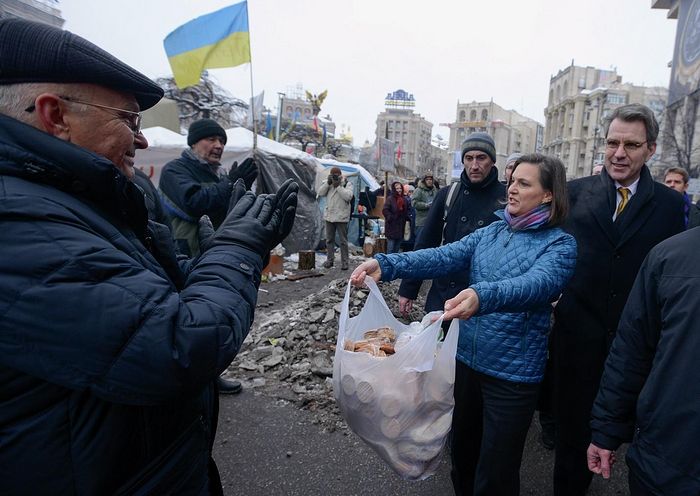 Victoria Nuland at Maidan. Photo: Sputnik international.
Victoria Nuland at Maidan. Photo: Sputnik international.
In case anyone needs a reminder, the Maidan Coup is what transformed Kiev and Ukraine from a happy normal European place to…well…this…
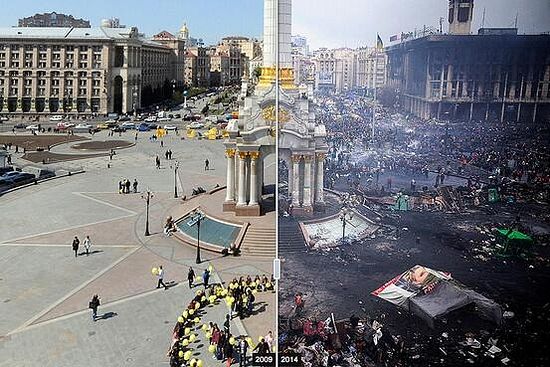 The Maidan (Square) of Independence before and after the western-backed Coup. Photo: Twitter.
The Maidan (Square) of Independence before and after the western-backed Coup. Photo: Twitter.
That is essentially the microcosm of who funds and supports the Ecumenical Patriarchate (i.e. on whom they are completely dependent for their very survival), and with that in mind, its not hard to figure out what agendas they secretly support, and why.
Did a New York Embezzlement Scandal spark this entire conflict?
It’s an open secret that there was a massive scandal, regarding the apparent disappearance of massive sums of money, around $10 million21 of the 37 raised for the building of a Greek Cathedral in New York.
Michael Huffington even called for the resignation of Archbishop Demetrios over all this.
The response of Archbishop Demetrios was incredible; he said that the donors “don’t have the right to ask what happened to the money, just as he does not ask them how they made their money”. This all seems indicative of just how cynical and politically minded people behave in GOARCH hierarchy and the Ecumenical Patriarchate.
In this excellent article by James George Jatras, a former U.S. diplomat, last July, the US State Department became aware of the mysterious disappearance of these funds.
While authorities are currently investigating the situation, it is alleged, and quite plausible that someone from the highest echelons of U.S. power gave the Ecumenical Patriarchate a secret deal in this scandalous case—“We’ll leave your primary source of income safe—but you must in return create a crisis for the Russian Church by supporting the Ukrainian schismatics.”
As with all of this, one has to read in between the lines, and connect the dots, but looking at the history of the captivity of Constantinople to the political whims of foreign powers, and especially its relationship with the US in the twentieth century, this is not only possible, its plausible.
Father Seraphim Gan noted that it appears Constantinople is not free in his actions, but under the influence of un-Christian powers.
Metropolitan Jonah, a ROCOR Hierarch and former Primate of the Orthodox Church in America wrote in this amazing article [lightly edited for context]:
“And so the United States State Department and agencies support a disgraced and legitimately defrocked charlatan who is all dressed up [Philaret], and who is himself manipulating the pathetic [Ukrainian President] Poroshenko, for his own ambition. They have blackmailed the elderly Ecumenical Patriarch [Bartholomew], in regards to the disappearance of funds from the [Greek American] American Archdiocese, and then bribed him. To justify himself he asserted an interpretation of his own jurisdiction that is rejected by the rest of the Orthodox Churches.”
Conclusion: Constantinople has become a tool for Western politics
A simple historical picture becomes obvious:
- Constantinople was a city of great Patriarchs, but also of great heretics like Nestor himself.
- Shortly before the fall of Constantinople, they almost entered into union with Rome.
- After the fall in 1453, the Patriarchate was completely at the mercy of the Turks.
- After WW1, Constantinople lost almost all of its flock; at this time it caused the calendar conflict and supported the Bolshevik renovationist schism. A liberal trend emerged in the twentieth century.
- In the 1950s, Athenagoras, a strong ally of US President Truman becomes Patriarch. Athenagoras becomes the first Patriarch to meet with the Pope. Athenagoras leads the Ecumenical Patriarchate to play a major role in promoting U.S. Foreign policy in Orthodox countries and against Moscow.
- In 1971, Halki Seminary was closed; the future of the Patriarchate is called into question.
- By 2018, The Patriarch of Constantinople has met and prayed with the Pope numerous times, and broke tradition allowing Priests to be remarried. The Patriarchate is at its weakest and smallest state yet.
- In July of 2018, the US Government allegedly pressured the Patriarchate via their primary source of funding in relation to the GOARCH scandal.
- In September of 2018, Constantinople invades the canonical territory of the UOC and the Moscow Patriarchate.
Note the trend: the closer Constantinople grew to foreign political powers, for example, the Ottoman Empire or the USA, the farther their practice came from Orthodoxy. The more Constantinople weakened throughout history, the more it strongly tilted to Western influence.
Constantinople has become a tool for Western powers, which most likely started this mess in Ukraine at their behest. One must only look at the illogical way this autocephaly movement was planned. Patriarch Bartholomew is not an unintelligent man; even if he is blinded by papal delusions, he had to know this would not work.
Already, so far, not a single Local Church has supported Constantinople or the schismatics, many churches and hierarchs have spoken out against Constantinople’s actions. One of the most famous English-speaking Bishops, the most esteemed Metropolitan Kallistos (Ware), a bishop of the Ecumenical Patriarchate himself, said:
“With all due respect to my Patriarch, I am bound to say that I agree with the view expressed by the Patriarchate of Moscow that Ukraine belongs to the Russian Church.”
Constantinople a few months before supports the canonical church, and then makes a total 180 turnaround, begins propagating papal grandeur, invading the canonical territory of the largest Orthodox Patriarchate in the world, and declaring they can grant and revoke autocephaly.
This was all as if planned by people who don’t understand how the Orthodox Church even works, or what is within the Ecumenical Patriarchs powers, but simply wish to create problems for Orthodoxy and Russia specifically…
It seems while being occupied and at the mercy of foreign political powers, it’s impossible for Constantinople to make rulings for the good of the rest of the Orthodox world. While Orthodoxy will not have any supreme papal figure—only Christ is the head of the Church—if there is going to be a first among equals—perhaps he should dwell in an Orthodox power strong enough to preserve its own sovereignty.
